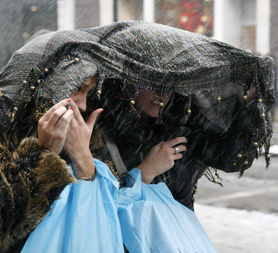UK snow: effect on shoppers
Snow on the last Saturday before Christmas, traditionally one of the busiest shopping weekends of the year, spells potential disaster for retailers.
But with warnings that online deliveries might not make it in time, many shop-owners are hoping that could help them make up some of their losses.
After a tough December, many sales started early with discounts of up to 50 per cent.
Brent Cross shopping centre in north London was forced to close this afternoon as the capital was battered by wintery showers.
Elsewhere in London, however, bargain hunters flocked to the West End, where shops remained open.
UK Uncut protesters joined shoppers at Topshop, one of 55 actions in various shops round the country demonstrating against funding cuts and alleged tax avoidance.

Small retailers under threat
Freezing weather means independent food producers are struggling to make sales on what is normally their most important shopping weekend of the year.
In central London, as heavy snow carpeted the ground, producers shivering at a special outdoor Christmas food fair on the city’s South Bank were hoping enough customers would manage to get there.
Organiser Philip Lowery, from the Real Food Festival said many small producers traditionally gear up extra production specially for Christmas, and most of them had managed to make it into London to set up stall.
“But of course they are dependent on shoppers who are likely to be put off by the snow. It’s particularly frustrating as the food available this weekend is extraordinary and in normal circumstances would be an utter delight for the public,” he said.
Other parts of the country have been coping with even more extreme conditions. Fiona Sciolti, a chocolatier in North Lincolnshire, said the weather there had been as bad as anything in Scotland, with postal deliveries totally stalled for more than a week, affecting supplies of ingredients as well as her mail order business.
On top of that, dozens of local markets have either been cancelled – or have been pretty much bereft of shoppers.
As a chocolate maker, she said December was her most important month of the year. “You don’t sell anything in January at all – so you rely on this time of the year to make enough money to tide you over the next six weeks,” she said. But the problems with mail deliveries – nothing getting beyond Doncaster for days – meant at one stage last week she ran out of chocolate supplies altogether – and customers who’d ordered online were not getting their goods.
“Show after show has been cancelled,” she said. “So you don’t know how much to produce. If you manage to turn up to a market, there’s no guarantee anyone will be there to buy stuff. If you decide not to go, or simply can’t get there, and it does go ahead, you lose the money you’ve paid to have a stall. It’s very hard to make a decision.”
And she said it is even more difficult for people producing highly perishable food, like bread or cupcakes, who stand to lose out even more if goods go unsold. At this time of year, she said, if one weekend’s business is cancelled, “it’s a massive blow”.
For others, the extreme weather is already proving devastating. One Lincolnshire herb grower now faces starting all over again after the prolonged snow and sub-zero temperatures froze his entire crop, ruining everything.
He had built polytunnels designed to cope with temperatures as low as minus seven – but the sheer severity of the weather led to frozen water pipes and power cuts and in the end, simply proved too much.
There have been similar problems in South Wales this weekend, with traders describing it as “a write-off” and an “absolute nightmare”.
One stall holder at one of Cardiff’s specialist Christmas markets said business had been “killed” by the weather – and warned some traders could be driven out of business altogether.
The Centre for Economics and Business Research has warned as many as 800 or 900 businesses could go bankrupt which otherwise would not have – “because this is the straw that broke the camel’s back”.
In total businesses fear they could suffer an additional £8.4bn loss because of the wintry weather – and this after what’s already been a pretty terrible year.
But producers like Fiona Sciolti say they’re still determined to get out and carry on selling – and in lots of market towns, local people have worked hard to clear market squares and access roads of snow and ice. Like the stall holders battling to keep warm at London’s South Bank market, they are just hoping enough shoppers manage to brave the conditions and support them.
-
Latest news
-
‘I violated my moral compass working for Trump,’ former lawyer testifies3m

-
Working class creatives in film and TV at lowest level in decade5m

-
Israeli police investigating attack on Gaza aid convoy4m

-
Biden announces major tariff increase on Chinese-imported green tech3m

-
‘If NHS can afford it, people with obesity should have Semaglutide,’ says weight loss expert5m

-




